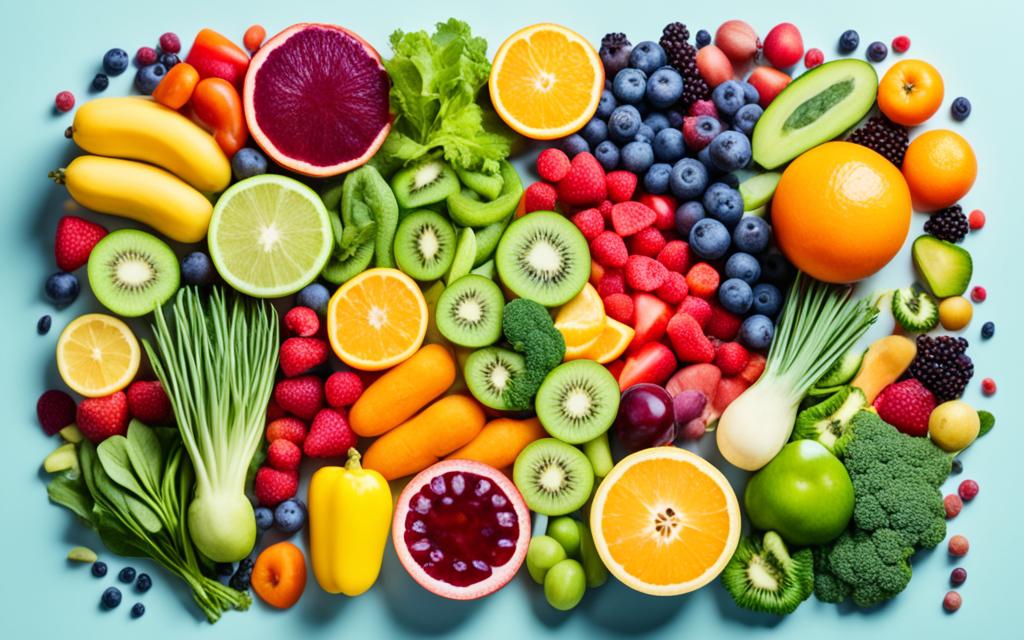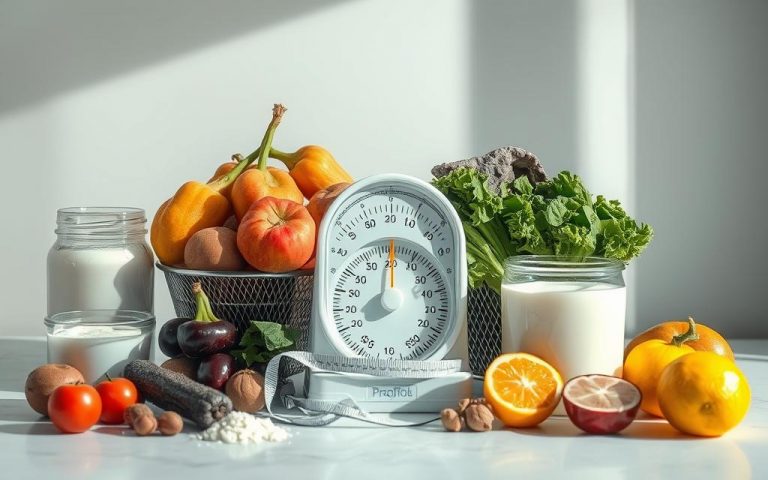Prebiotics & Probiotics: How They Work Together for Health
In the world of gut health, prebiotics and probiotics join forces. They support a balanced microbiome and our well-being. These two work together to help the beneficial bacteria in our gut. This leads to many health advantages.
Key Takeaways
- Prebiotics act as food for probiotics, allowing them to thrive in the gut.
- Together, prebiotics and probiotics help maintain a balanced gut microbiome.
- A healthy gut microbiome aids in digestion, nutrient absorption, and immune function.
- Incorporating prebiotic and probiotic-rich foods into your diet can support gut health naturally.
- Supplements can provide an additional source of prebiotics and probiotics for those who may need it.
This article explores how prebiotics and probiotics work as a team. They help your gut have a lot of good beneficial bacteria. This duo leads to better digestion, a stronger immune system, and overall health.
Introduction to Prebiotics and Probiotics
Our gut is critical to our well-being. Keeping the digestive system healthy means taking care of our gut flora. This delicate balance includes trillions of microorganisms, such as helpful bacteria and yeasts. They work together to keep us healthy.
What Are Prebiotics?
Prebiotics are a special kind of fiber sources that act as food for the good bacteria in our stomach. These carbohydrates can’t be digested. Foods like onions, garlic, bananas, and whole grains are rich in them. They help the good bacteria grow and stay strong.
What Are Probiotics?
Probiotics are live bacterias and yeasts that are very good for us. They are present in fermented foods such as yogurt, kefir, sauerkraut, and kombucha. We also find them in some supplements.
The Importance of Gut Health
Having a well-balanced gut flora is key to enjoying good health. Good bacteria in our stomach help us digest and absorb nutrients. They also boost our immune function. Our immune system is strongly linked to our gut. A healthy gut makes our immune system strong against diseases.
Knowing about prebiotics and probiotics allows us to care for our gut. This can lead to a better-working digestive system and a stronger immune system.
How Prebiotics and Probiotics Collaborate
Prebiotics and probiotics team up to keep our gut healthy. They work together to let good bacteria grow strong. At the same time, they help keep bad bacteria under control.
Prebiotics Fuel Probiotics
Prebiotics are like food for probiotics. They give probiotics the energy they need to flourish in our gut. These non-digestible fibers feed the probiotic bacteria. This helps probiotics thrive and improve our gut health.
Synergistic Effects on Gut Flora
Prebiotics and probiotics tag team to maintain a healthy gut flora. Probiotics introduce helpful bacteria to our gut. Meanwhile, prebiotics set up a good home for these bacteria. Together, they push out the bad bacteria. This makes our gut home to a rich and varied community of microbes.
By working together, prebiotics and probiotics keep our gut in balance. This teamwork is key in keeping our digestion, nutrient uptake, and immune system strong.
Benefits of Prebiotics and Probiotics
Prebiotics and probiotics are a team that makes your gut flora healthy. They help by growing beneficial bacteria in your gut. This boosts digestive health and makes your immune function stronger.
Improved Digestive Function
A good gut balance means better digestion, thanks to prebiotics and probiotics. Probiotics help break down food, pulling out important nutrients. This can ease bloating, gas, and constipation, making digestion smoother.
Enhanced Immune Response
A major part of your immune system is in your gut, which is where prebiotics and probiotics help. They make a strong gut flora, fighting off harmful bugs. This balance supports a better immune function, lowering your sickness risk.
Adding prebiotics and probiotics to your daily diet helps whether you want to feel better digestively or strengthen your immune system.
How Do Prebiotics and Probiotics Work Together?
Prebiotics and probiotics work together in the gut to keep it balanced and healthy. Their teamwork is key for a good gut and better health.
The Prebiotic-Probiotic Relationship
Prebiotics are like food for probiotics. They help the good bacteria grow and spread in the gut. These fibers are not fully digested. Instead, they help good bacteria grow by breaking down.
Then, probiotics break down prebiotics. This action makes it easier for our bodies to get the prebiotics’ goodness. This partnership keeps the gut’s good bacteria in check, boosting our health.
Optimizing Gut Microbiome Balance
Prebiotics continue to feed the good bacteria in our guts. This feeding process helps the good bacteria overpower harmful ones, keeping the gut in balance.
Meanwhile, probiotics break down prebiotics to create useful substances. These substances help reduce inflammation and make our guts stronger. This helps our bodies absorb nutrients better and stay healthy.

This friendly partnership of prebiotics and probiotics is vital. It helps keep our gut’s inner world diverse and strong. This is crucial for good digestion, using food well, and staying healthy.
Food Sources of Prebiotics and Probiotics
Eating foods rich in beneficial bacteria and fiber sources supports good gut health. This means adding certain foods to your diet brings many benefits. Luckily, there are many options from nature to choose from. These foods help ensure your stomach is a happy place for bacteria.
Prebiotic-Rich Foods
Plant-based foods are great for prebiotics because they’re full of fiber. For example, you’ve got:
- Onions
- Garlic
- Bananas
- Whole grains like oats, barley, and wheat
- Legumes such as lentils, chickpeas, and beans
- Asparagus
- Artichokes
Probiotic-Containing Foods
For more beneficial bacteria, turn to fermented foods with live cultures. It’s not only healthy but tasty too. There’s lots to choose from:
- Yogurt (Greek and traditional varieties)
- Kefir (a fermented milk drink)
- Sauerkraut
- Kimchi
- Miso
- Tempeh
- Kombucha
By adding a mix of prebiotic and probiotic foods to every meal, you support a strong gut flora. This keeps your digestive system and whole body healthy.
| Food | Prebiotic/Probiotic | Benefits |
|---|---|---|
| Yogurt | Probiotic | Supports gut health, boosts immunity |
| Onions | Prebiotic | Feeds beneficial bacteria, aids digestion |
| Sauerkraut | Probiotic | Promotes a healthy gut flora, aids nutrient absorption |
| Whole Grains | Prebiotic | Provides fiber for beneficial bacteria growth |
Supplementing with Prebiotics and Probiotics
Using prebiotic and probiotic-rich foods is great. But, nutritional supplements make it easy to get enough. They are a handy way to help your gut health and keep your microbiome balanced.
Prebiotic supplements have fibers like inulin, GOS, or FOS. These fibers feed the beneficial bacteria in your gut. This helps them grow and stay healthy. Probiotic supplements have live good bacteria, such as Lactobacillus. They add to the variety of bacteria in your gut.
When picking these supplements, choose carefully. Always go for products made by trusted brands. They should have proven benefits and enough good bacteria or fibers.
Remember, not all supplements are created equal, so it’s important to read the labels carefully and consult with a healthcare professional, especially if you have any underlying health conditions or dietary restrictions.
Prebiotic and probiotic supplements can help your gut health in many ways. They might make digestion better, your immune system stronger, and lower the risk of certain gut issues. They could even help with conditions that cause inflammation.
| Prebiotic Supplements | Probiotic Supplements |
|---|---|
| Inulin | Lactobacillus acidophilus |
| Galacto-oligosaccharides (GOS) | Bifidobacterium longum |
| Fructo-oligosaccharides (FOS) | Lactobacillus rhamnosus |
| Resistant starch | Saccharomyces boulardii |
Lifestyle Factors Affecting Gut Health
Keeping your gut healthy is about more than what you eat. It’s also about your daily life choices. Things like prebiotics and probiotics help. But, how we live can also really mess with our digestive system.
Stress and Gut Health
Long-term stress is bad news for your gut health. It can make your immune system weaker. This happens because stress makes our bodies let out cortisol. That messes up the important bacteria in our gut, leading to possible issues like tummy troubles, swelling, and a poorer defense system.
Exercise and the Microbiome
Regular exercise, however, is great for our gut bugs. It helps the good bacteria in our stomachs thrive. This bump in beneficial bacteria helps our digestive system and our defenses. Some science even says certain exercises may up the number of good gut bugs you have.
Staying calm with activities like meditation is good for your stomach. So are fun workout staples like going for a walk or doing yoga. These things can make your gut bugs very happy and healthy.
Everything comes together to keep your gut health in top shape. Eating right, using prebiotics and probiotics, managing stress, and staying active. It’s an all-around strategy to feel great and strengthen your defense system.
Addressing Common Concerns
Using prebiotics and probiotics is mostly safe, but many worry about side effects. They might cause gas or bloating at first. But, these issues usually go away quickly. To avoid them, start with a small amount and drink plenty of water.
Safety and Side Effects
Most people can use prebiotics and probiotics without trouble. Yet, it’s wise to talk to a doctor first, especially if you’re ill or on meds. Some probiotics could be bad if your immune system isn’t working well.
Start with small doses of these supplements and slowly take more. Your body can then better handle the good bacteria and fibers. Plus, drinking enough water helps with any bloating or gas.
Choosing Quality Supplements
It’s very important to pick good quality prebiotic and probiotic supplements. Choose brands that have been tested by outside groups and meet high standards. Be sure they have the right probiotics and prebiotics to help you.
For probiotics, check for the strain type and the number of live organisms (CFUs). More CFUs usually mean a better product. When looking at prebiotics, pick ones with known benefits, such as inulin or GOS.
By knowing the key points and choosing wisely, prebiotics and probiotics can be a big help in staying healthy. They work to balance your gut bacteria, supporting your overall health.
Conclusion
The link between prebiotics and probiotics is captivating. It shows how nature mixes to boost gut health and well-being. Good bacteria love prebiotic fibers. This leads to a balanced microbiome that aids digestion, absorbs nutrients, and supports the immune system.
Knowing how prebiotics and probiotics work together lets you boost them. Add onions, garlic, and whole grains for prebiotics. Include yogurt and fermented veggies for probiotics. This mix helps your gut stay healthy. You can also use supplements to get enough of these nutrients.
Choosing a lifestyle that feeds your gut’s good bacteria has many pluses. It can better your digestion and make your immune system stronger. A rich and tough community of beneficial bacteria means a healthy gut. This, in turn, enhances your body’s defense system.
FAQ
What are prebiotics and probiotics?
Prebiotics are a special kind of fiber that feed the good bacteria in your gut. Probiotics are live microorganisms that help keep your digestive system healthy.
Why is gut health important?
A well-balanced gut helps you digest food, absorb nutrients, and keeps your immune system strong. Good gut bacteria is key to your overall health.
How do prebiotics and probiotics work together?
Prebiotics feed the probiotics, which then grow in numbers in your gut. This teamwork ensures your gut is full of diverse healthy organisms, benefiting digestion and the immune system.
What are the benefits of prebiotics and probiotics?
They can make digestion better and help reduce bloating and constipation. Also, they boost your immune system and help you fight off harmful bacteria.
What are good food sources of prebiotics and probiotics?
Find prebiotics in foods like onions, garlic, bananas, and various whole grains. For probiotics, eat things like yogurt, kefir, sauerkraut, and kombucha.
Should I take prebiotic and probiotic supplements?
Eating a balanced diet is best, but supplements can help fill any gaps. They’re good for people with special dietary needs or conditions.
Are there any side effects of taking prebiotics and probiotics?
Taking prebiotics and probiotics is usually okay, but they might cause some gas or bloating at first. Just make sure you pick good supplements and use them as directed.
How do lifestyle factors like stress and exercise affect gut health?
Long-term stress can mess up your gut health. But, exercise keeps your gut full of strong and healthy bacteria. So, managing stress and staying active are both great for your gut.







